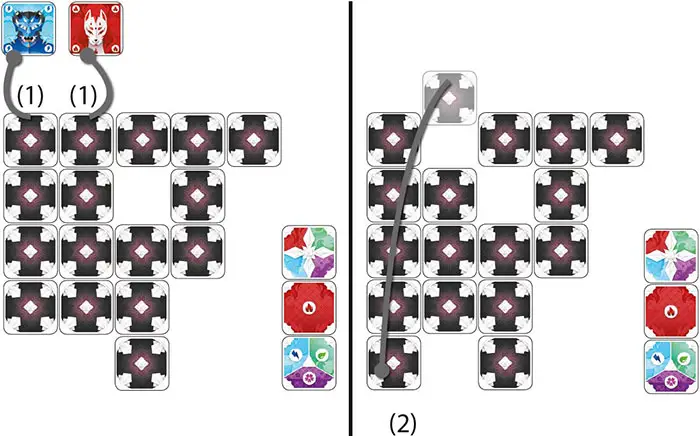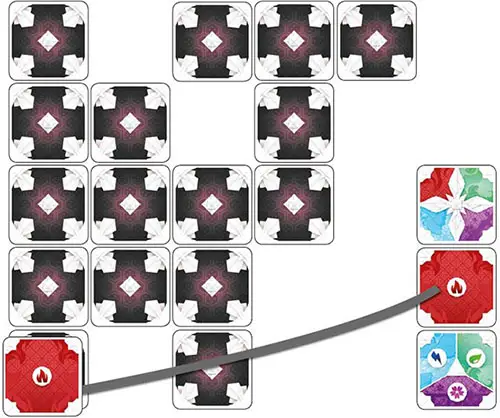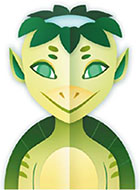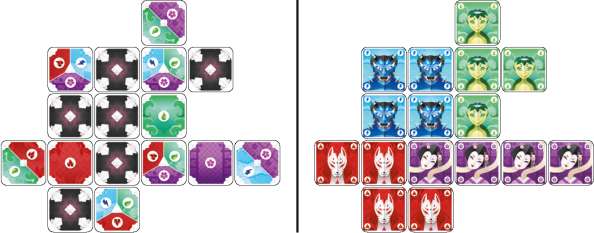
The Yokai are in great disarray! These Japanese Spirits got mixed with one another and, to appease them, you will need to group them by families.
Yokai is a cooperative game in which your communication will be limited. You will need to work as a team and use your memory to appease the Spirits.
Components

- 16 Yokai Cards
- 14 Hint Cards
- 6 Affinity Cards
- 3 Objective Cards
- Instructions
Object of the Game
In a set number of turns, Players try to gather the Yokai by families:

Setup
Shuffle the Yokai Cards and place them face down in the center of the play area in a 4 x 4 grid.
Randomly take as many Hint Cards as shown in the table below, according to your player count. Do not look at these cards.

Shuffle these cards and place them in a pile where everyone can reach them.
The First Player is the player most afraid of ghosts.


Communication Among Players
Beware, the Yōkai are mischievous creatures and you are never allowed to communicate on their color or their position.
That is what the Hint Cards are for!
Game Play
On your turn, you must do the three following actions in this order:
- Peek at two Yokai Cards
- Move one Yokai Card
- Reveal or Place a Hint Card
1. Peek at two Yokai Cards
Choose any two Yokai Cards (they don't have to be adjacent) and secretly take a look at them. You can choose the second card after looking at the first. Put the cards back where they belong.
2. Move One Yokai Card
Choose any one Yokai Card you may have looked at or not, and move it. The card's destination must be adjacent to another Yokai card. Splitting the Yokai Cards in different groups is forbidden; they must always be connected by their side (not by their corners).
While moving the Yokai Card, you may happen to create two separate groups. This is allowed as long as the groups are reunited at the end of the move.
Examples

It's Nicolas's turn. First, he secretly takes a look at two Yokai (1). He discovers an Oni and a Kitsune and puts them back where he took them. Then he must move a Yokai, making sure not to split the group apart.
3. Reveal or Place a Hint Card
You must:
- either reveal a face-down Hint Card,
- or place a previously revealed Hint Card.
All revealed Hints are accessible, and should not be stacked.
A Hint placed on a Yokai Card locks it down.
From then on, this Yokai can neither be looked at, nor moved. When placing a Hint, you must choose what Hint to place and what space it targets wisely to give valuable information to your partners. A Hint gives an indication on the identity of the Yokai it locks down; it can show:
precisely the Yokai's identity
 , or
, ortwo identities, one of which matches that of the Yokai
 , or
, orthree identities, one of which matches that of the Yokai
 .
.
Unless a mistake is made, a locked-down Yokai's identity should match one of those displayed by the Hint Card locking it down. You can't place two Hint Cards on the same Yokai Card.
Example:


Nicolas must now reveal or place a Hint Card. He decides to place the previously revealed
Kitsune Hint and places it on the Kitsune Card he moved before in order to give this piece of information to the other players.
End of the Game
The game may end in two ways:
- either when a player declares the Yokai are appeased instead of taking their turn,
- or when the last Hint Card has been used to lock down a Yokai Card.
Once the game is over, flip all Yokai Cards, checking that the Hint Card on top of them matches.
If the Yokai are appeased (grouped by families), you win the game. Otherwise, you lose.
Example of a game won by the players:

Scoring
You successfully appeased the Yokai? Congratulations! You can now calculate your score. The score is based on Hint Cards:
- a correctly-placed Hint is worth 1 point,
- an incorrectly-placed Hint is worth -1 point,
- a Hint that was revealed but not used is worth 2 points,
- a Hint that was not revealed is worth 5 points.
You can assess your victory based on the Table below!
In the future, you can try to do better until you succeed in fully appeasing the Yokai!

Increasing Level of Difficulty
As you play Yokai, your experience with the game increases and you can try to solve more complex situations. If you win a game at a given level of difficulty, you can either try increasing your score at this level, or go to the next level of difficulty:
-
Level 1: apply basic rules.
-
Level 2: apply basic rules + add a random Affinity Card (see below), visible only to the first player, who must not reveal it.

Affinity Cards: they indicate that the shown Yokai families must be adjacent by at least one of their respective Yokai at the end of the game.
-
Level 3: apply basic rules + stack Hint Cards when revealing them. You may only place the last revealed Hint.
-
Level4: apply basic rules without revealing Hints. Instead, take the top Hint Card and put it down besides the deck without flipping it.
This Hint Card can then be used to lock down a Yokai without giving any information to the other players. All placed Hints are considered correctly placed for the needs of scoring.
-
Level5: apply basic rules + add an Objective Card (see below) of your choice, visible to all.

Objective Card: they indicate the shape all the Yokai Cards must match at the end of the game.
At Levels 2 and 5, if the condition given by the card isn't met, you lose the game and don't score any points.
Other Levels of Difficulty
At the start of the game, players may decide to take more one-color Hint Cards (to make the game easier) or more three-color Hint Cards (to make the game more difficult), without changing the total number of cards.
At the start of the game, Affinity Cards can be dealt to several players, who will all need to complete their objective at the end of the game, without revealing it to the other players.
Your Path
If you feel so inclined, you can check your successes below.
Do not consider this list as a score mark, rather use it as a way to assess how far you've come.
As you play games, you will learn how to master the game and the difficulty level will evolve as you progress.

Once you master all levels of difficulty, you can try and mix the various levels' constraints.

Continue Reading